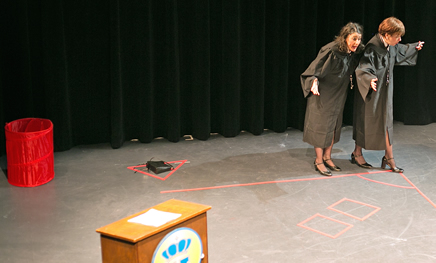The Raleigh Symphony Orchestra occupies a slightly different niche than that of its neighbor in Raleigh, the NC Symphony, which plays to larger audiences in a larger hall. The RSO presents its programs in the intimate and attractive surroundings of Jones Auditorium at Meredith College, with popular works at popular prices. The magnet for the spring concert was the familiar Concierto de Aranjuez by Joaquin Rodrigo, attracting aspiring guitarists (at least three in the row next to your reviewer, including two under age ten). The evening opened, however, with the National Anthem, conducted by the winner of a raffle (tickets: one dollar), Erica Rogers, who acquitted herself well. (This is a notion that would bear wider distribution, given the excitement it generated among concert-goers).
Music Director Jim Waddelow (of the Meredith faculty) got down to business with the Symphony No. 1, Op. 21 of Beethoven, with a nice brisk tempo in the opening movement, and fine ensemble by the orchestra in tossing the composer’s brief motives back and forth between sections. The quick Menuetto is perhaps the first moment where listeners begin to get a glimpse of the mature Beethoven (the work was published in 1801), and here there were moments in which the ensemble was slightly out of phase, the only blemish in an otherwise powerful rendition.
The themes of the Concierto de Aranjuez are so familiar to the listener (not least from the arrangement of the second movement for Miles Davis and the Gil Evans Orchestra) that the sheer genius and virtuosity of the piece as presented by guitarist Ed Stephenson and the Raleigh Symphony Orchestra might come as a shock. This is a major, original composition by a major composer, and it is to our loss that Rodrigo is not more present in our concert life. Stephenson’s many local fans had an excellent opportunity to hear, up close, a breathtaking performance, with lightning-fast passagework flying from his fingers. The piece is full of idiomatic writing for the guitar, with Spanish melodies and harmonies memorably realized by the orchestra. Stephenson, who also teaches at Meredith, sounded entirely at home in the work. Bravo!
Concluding the evening was the familiar Symphony No. 8, Op. 88 by Dvořák, a piece from the close of the nineteenth century which draws notably on Eastern European motives, particularly in the harmonies of the slow movement. The Raleigh Symphony Orchestra, with an augmented brass section for this work, made a glorious noise, with an exhilarating run to the final cadence. A highly worthwhile program – I am looking forward to next season.











